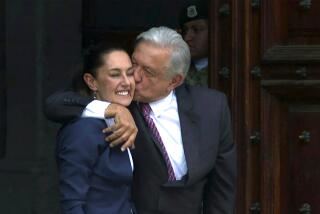PERSPECTIVE ON MEXICO : Salinas Bets All on ‘the Good Son’ : His longtime protege, Luis Donaldo Colosio, is expected to further the president’s agenda and secure his reputation.
MEXICO CITY — Two considerations led President Carlos Salinas de Gortari to choose Luis Donaldo Colosio as his successor: history and loyalty. By anointing the minister of social development as the government party’s presidential candidate, Salinas guarantees the continuity of the modernization process he set in motion five years ago and assures his place in Mexico’s history.
Colosio owes his political existence to Salinas. Colosio began his ascent through the Mexican political class in 1979 as a Salinas disciple in the Ministry of Budget and Planning. There Salinas groomed and propelled his protege into a congressional seat, followed by chairmanship of the PRI (the Institutional Revolutionary Party) and the Ministry of Social Development. During these diverse professional incarnations, Colosio developed a national political network, but always under Salinas’ aegis. Following a vintage political habit, Salinas, 45, has chosen this “son,” 43, to be the country’s next president.
Sons rarely betray their political fathers, and this is Salinas’ gamble. He has passed the torch to an opaque and enigmatic figure who, he trusts, will consolidate the Salinas project instead of jeopardizing it.
Colosio’s rivals for the honor had minds and visions of their own. Finance Minister Pedro Aspe Armella would perhaps have deepened Mexico’s economic revolution, going far beyond the bold moves Salinas has already undertaken. Mexico City Mayor Manuel Camacho Solis would perhaps have dealt with the thorny problems of Mexican democratization in a forceful way. Choosing either of them would have been tantamount to admitting that there is unfinished business on the Salinas modernization agenda. By selecting Colosio, whose vision of Mexico’s future has been drawn by himself, Salinas assures his place in Mexico’s future. Colosio will govern under Salinas’ shadow, furthering Salinas’ agenda as if it were his own. Salinas will be remembered as Mexico’s Great Modernizer, and Colosio’s position in the country’s hall of fame will be, at best, that of the President Who Came After Salinas.
Crucial electoral imperatives are also behind Salinas’ decision. Among the contenders, only Colosio has held a “popularly elected” position. And, as president of the PRI, he became familiar with the party’s operating procedures and the unwritten rules that govern its electoral machinery. He led the party to a remarkable comeback during the 1991 midterm elections. As a reward, Salinas put him in charge of his pet project: the National Solidarity Program, a poverty alleviation project heavily invested in public works, which has been remarkably successful as a political tool. Colosio is a man of the party and is familiar with the art of pork-barrel politics. This combination will assure him a contested but likely victory in the August, 1994, presidential election.
Colosio’s political credentials are helpful to Salinas in other ways. Despite his undeniable popularity, Salinas has had to live with his “original sin”: the accusation that he stole the 1988 election. In order to shed his lingering image as an initially illegitimate leader, Salinas will turn the presidential contest into a referendum on his entire modernization project. A Colosio victory will confer legitimacy on the Salinas presidency. Salinas will go down in the annals of Mexican history unblemished. The son will redeem the father.
Colosio is undoubtedly the best candidate for the PRI and for Salinas, but will he be the best candidate for the country? Salinas did not choose Aspe, the brilliant technocrat, or Camacho, the emblematic political animal. Instead he chose the least distinguished and distinguishable of the lot: a president who will consolidate, but not deepen or accelerate Mexico’s modernization.
Salinas’ revolution is still far from complete. Much remains to be done in the realms of economic growth, productivity, income distribution, poverty alleviation, education and democracy. Colosio’s nebulous emphasis on consolidation might lead to paralysis in a country that is racing to join the First World but still needs to run many a mile. Salinas made a safe choice; whether he made the best choice, time will tell.
More to Read
Sign up for Essential California
The most important California stories and recommendations in your inbox every morning.
You may occasionally receive promotional content from the Los Angeles Times.










